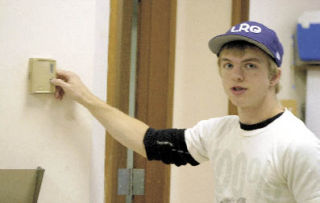LANGLEY — With costs rising and state enrollment dollars dropping, the South Whidbey School District will listen to anyone who can help.
So when high school senior Chase Brown told the school board last week he could save the district money, they listened.
Based on an energy audit Brown conducted for an environmental sciences class taught by Jay Freundlich, the student reported his findings.
“Last year the high school spent $132,669.32 on their electric bill,” Brown said. “With the help of my team, I found that we can save 6 to 24 percent off the utility bill by replacing thermostats and lighting.”
But he also found a way to help pay for the improvements. Brown told school board members the district could get a 40 to 50 percent rebate on materials and labor needed for the improvements from Puget Sound Energy.
Brown discovered firsthand how energy could be saved in South End schools.
At one point, Brown set a classroom’s thermometer at 70 degrees and kept note of the room’s temperature fluctuations throughout the day. When it reached 85 and stayed there, Brown knew he was on to something.
“That one room was wasting energy and money,” he said. “I graphed the data and figured what the savings would be. New controls would help make classrooms more comfortable learning environments.”
He added that better lighting with a wider color spectrum reduces a “strobe” effect that’s sometimes linked to migraine headaches.
Brown said new heating controls would cost $40,000, and a corresponding 40 percent grant from Puget Sound Energy would help offset the cost of replacing the lights with advanced compact fluorescent fixtures, including installation, labor and materials.
“Newer T8 lights use one-third less energy but cost the same,” he said. “If the board had made this move 10 years ago, the district could have saved more than $185,0000.”
Brown explained that the payback period for retrofit projects are very short. But the money is already in line for new thermostats from the levy that passed earlier this year.
“What I am asking for is that the installation date be pushed from the summer of 2009 to the summer of 2008 and the money saved from the PSE rebates be used to install newer energy efficient lighting in all the high school classrooms,” he said.
Brown worked closely with Langley’s resource conservation manager, Linda Irvine, as well as PSE employee Jason Hyatt and district maintenance director Joe Anastasi to come up with the plan.
His helpers have been impressed.
“So many people are attracted to renewable energy,” Irvine said. “But Chase looked closely at conservation and efficiency and found he could make a bigger impact by opening a door others ignored. He did a very professional job.”
Brown hopes to continue his focus on conservation issues after he graduates. In the fall he will study environmental science at Western Washington University.
“I really like finding practical, real-world applications that can make a difference,” he said. “It’s a growth industry and I think I can contribute.”
He has high praise for his science teacher.
“Any class that encourages students to explore their potential is a good one and Mr. Freundlich has been a huge help.”
The entire exercise helped Brown understand the value of working with the community outside the classroom.
“Without [Freundlich and Irvine] I would have been lost.”
Board member Helen Price Johnson was impressed by Brown and his findings.
“A wise and efficient use of our resources is one of the strategic directions the board has identified,” she said. “Chase did good work and we are proud of his efforts.”
The board will examine Brown’s findings and make a recommendation at its June 24 meeting.
“I think it is vital that our district set an example as a leader by adopting a progressive energy policy and striving to find ways to reduce our schools impact on the environment,” Brown said. “Not only will this send a message to the students and motivate them to think about their own actions and impact on the planet, but will also send a message to our community showing that we are a responsible school district.



